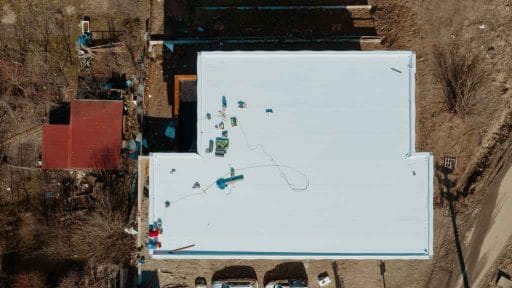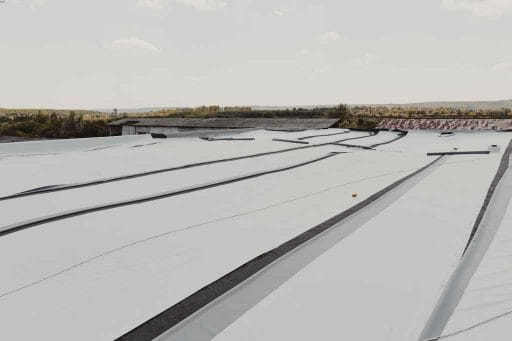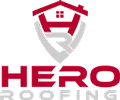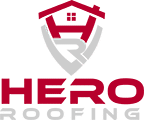
PVC
PVC stands for polyvinyl chloride, and it is a single-ply roofing material commonly used on flat or sloped commercial and industrial roofs. Engineers create PVC roofs with durability in mind, specifically engineered for strength.
Pros
Most PVC roofs last longer than 20 years, its roofing membrane is built with a minimum breaking strength of 200 pounds per inch, meaning it can withstand the inevitable micromovements that a building endures during harsh winds. PVC can withstand frequent exposure to chemical compounds, animal fat from grease, and even fire without wearing down. This roofing material maintains a strong fire-resistance rating because it is difficult to ignite, burns slowly, and can even self-extinguish once firefighters remove the flame source.
Cons
Your contractor might need to entirely remove the old roof to install, which can incur extra labor expenses. Although PVC can last up to 20 years, be sure to account for extra repairs once the roof reaches 10 years old. Older PVC is tricky to repair, but experienced contractors should be able to overcome these challenges if your roof is still in excellent overall shape. In addition, to avoid punctures and shattering, schedule all your maintenance and repairs on a warmer day in the winter, or wait until spring or summer.

TPO
TPO, properly known as Thermoplastic Polyolefin, is made up of a single layer of synthetics, usually a blend of polypropylene and ethylene-propylene rubber. Its primary advantage is that it’s typically the lowest material cost for single-ply membrane roofs. It typically comes in white on top, which can help reflect the sun’s light and stop heat buildup within the building.
TPO can be attached with adhesives, fastened directly to the roof deck, or even heat welded in places around chimneys and other protrusions. It resists corrosion, mildew, and algae growth, and does not require pressure washing, making it even easier to care for during the annual checkup.
Pros
TPO provides outstanding resistance to ozone, ultraviolet rays, and some chemical exposure at a low cost. It reflects heat radiation better than EPDM and resists mold growth, dirt accumulation, tears impacts, and punctures.
Cons
Heat welding the seams requires a very high-quality installation to hold up over time. Some formulations of TPO may not last much past the 10-year mark, and newer technology makes for a lack of a proven track record.
At Hero Roofing, we have years of experience in commercial roofing that will ensure you the job is done as intended the first time. If you’re ready to see what your roofing solutions can look like, schedule an estimate with us today.
 (833) 321-4376
(833) 321-4376


